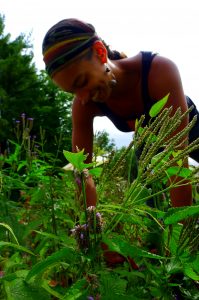 At Soul Fire Farm we believe that “to free ourselves we must feed ourselves,” and the challenges the COVID-19 outbreak is posing to our communities exemplify the need for collective food sovereignty. Before, during, and after the outbreak, food apartheid continues, and will continue, to disproportionately impact Black, Indigenous, and people of color (BIPOC) communities who also face higher vulnerability to COVID-19 due to factors like shared housing, lack of access to health care, environmental racism, job layoffs, immigration status, employment in the wage economy without worker protections, and more. This pandemic is presenting even more challenges to food access for our vulnerable communities.
At Soul Fire Farm we believe that “to free ourselves we must feed ourselves,” and the challenges the COVID-19 outbreak is posing to our communities exemplify the need for collective food sovereignty. Before, during, and after the outbreak, food apartheid continues, and will continue, to disproportionately impact Black, Indigenous, and people of color (BIPOC) communities who also face higher vulnerability to COVID-19 due to factors like shared housing, lack of access to health care, environmental racism, job layoffs, immigration status, employment in the wage economy without worker protections, and more. This pandemic is presenting even more challenges to food access for our vulnerable communities.
The emergency food system is struggling to keep up with increased demand as more people experience loss of income while food banks and food pantries are taxed by illness, unemployment, and fewer available volunteers. Grocery stores increasingly do not have surplus food to donate as they themselves also struggle to keep up with more demand due to panic buying. Individuals and families who are limited to WIC and SNAP-designated food purchases, do not have the space and/or financial resources to stockpile food, or usually rely on schools and other currently closed institutions for meals may be experiencing more acute food insecurity.
In addition to systems and policy change, home and community gardening can fill gaps in food access while bolstering longer term community food sovereignty. To meet some of the needs of our community members in Albany and Troy, N.Y., this spring we are offering materials, labor, and guidance to support folks in establishing 40+ raised-bed gardens. Our Soul Fire in the City program centers BIPOC folks impacted by food apartheid, survivors of mass incarceration, refugees and immigrants, people with disabilities or chronic illness, elderly folks, and families with children.
BIPOC-led organizations and communities have a rich history of growing food through provision gardens and continue to do so; this is not new. While Victory Gardens, rooted in anti-Japanese racism, and other land-based “patriotic” movements were being promoted as more “American” replacements for food systems powered by BIPOC labor, many BIPOC growers developed alternative food systems to sustain their own communities in response to internment, systematic discrimination, forced migration, and other forms of racialized violence and oppression. We see this work as a continuation of that legacy.
Much of the current language around home provisioning can be individualist and at times ableist. We recognize that provision garden initiatives must draw on community collaboration and mutual aid to support the needs and enable the participation of elders, people with disabilities and chronic illnesses, and other folks for whom home gardening is typically inaccessible. This project is about community resilience and collective food sovereignty, not about acting as “saviors” for our community.
Many farmers in our network have also experienced new challenges in the midst of the pandemic so to direct them to resources to support their projects we have been collaborating with Northeast Farmers of Color Land Trust, Black Farmer Fund, HEAL Food Alliance, and the Castanea Fellowship to host bi-monthly virtual skillshares for BIPOC farmers. These meetings catalyzed the creation of the Food & Land Sovereignty Resource List for COVID-19 which lists hundreds of resources to support BIPOC farmers. Every Friday we also co-host Ask a Sister Farmer with experienced Black womxn farmers during which we share basic skills on growing food and medicine with hundreds of viewers around the country.
